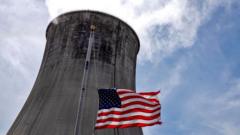On that day, the initial 7.8 magnitude quake struck while many residents were asleep, catching them off guard as buildings collapsed around them. Despite the Android Earthquake Alerts (AEA) system being operational, it only disseminated 469 serious "Take Action" alerts to those within a risk radius of 98 miles, when over 10 million people could have been warned. The tech giant initially claimed that the system had "performed well," but further investigation revealed it underestimated the quake's severity.
In total, around 500,000 users received a lower-level "Be Aware" notification—designed for minor shaking—that lacked urgency and visibility. The implications for those who needed immediate alerts were profound, leading to devastating consequences for individuals and families throughout the affected regions.
Google's researchers later published findings that pointed to limitations in their detection algorithms. They noted that the system miscalculated the strength of the initial quake at between 4.5 and 4.9, while it was actually a much stronger 7.8. A second major quake later that same day also received inadequate warnings, although subsequent algorithm adjustments provided more alerts based on post-event analysis, demonstrating improved system capabilities.
However, the time it took for Google to publicly address these failures has raised concerns within the scientific community. Experts like Elizabeth Reddy expressed frustration over the delay in transparency, especially when people's lives were at stake. The cautionary sentiment was echoed by Harold Tobin, who warned about the potential over-reliance on technological systems without comprehensive testing and verification.
While Google maintains that its AEA system is meant to complement existing national early warning systems, the incident has initiated a broader discussion about the efficacy and reliability of tech-driven solutions during natural disasters. As Google continues to enhance its earthquake response strategies, the urgency for accountability remains magnified in light of such a human tragedy.
The BBC has reached out for further commentary on AEA's performance during other seismic events but has yet to receive insights from Google. The calamity in Turkey underscores the crucial role of effective communication in disaster preparedness and response, challenging tech firms to ensure their systems are robust and reliable.
In total, around 500,000 users received a lower-level "Be Aware" notification—designed for minor shaking—that lacked urgency and visibility. The implications for those who needed immediate alerts were profound, leading to devastating consequences for individuals and families throughout the affected regions.
Google's researchers later published findings that pointed to limitations in their detection algorithms. They noted that the system miscalculated the strength of the initial quake at between 4.5 and 4.9, while it was actually a much stronger 7.8. A second major quake later that same day also received inadequate warnings, although subsequent algorithm adjustments provided more alerts based on post-event analysis, demonstrating improved system capabilities.
However, the time it took for Google to publicly address these failures has raised concerns within the scientific community. Experts like Elizabeth Reddy expressed frustration over the delay in transparency, especially when people's lives were at stake. The cautionary sentiment was echoed by Harold Tobin, who warned about the potential over-reliance on technological systems without comprehensive testing and verification.
While Google maintains that its AEA system is meant to complement existing national early warning systems, the incident has initiated a broader discussion about the efficacy and reliability of tech-driven solutions during natural disasters. As Google continues to enhance its earthquake response strategies, the urgency for accountability remains magnified in light of such a human tragedy.
The BBC has reached out for further commentary on AEA's performance during other seismic events but has yet to receive insights from Google. The calamity in Turkey underscores the crucial role of effective communication in disaster preparedness and response, challenging tech firms to ensure their systems are robust and reliable.

















